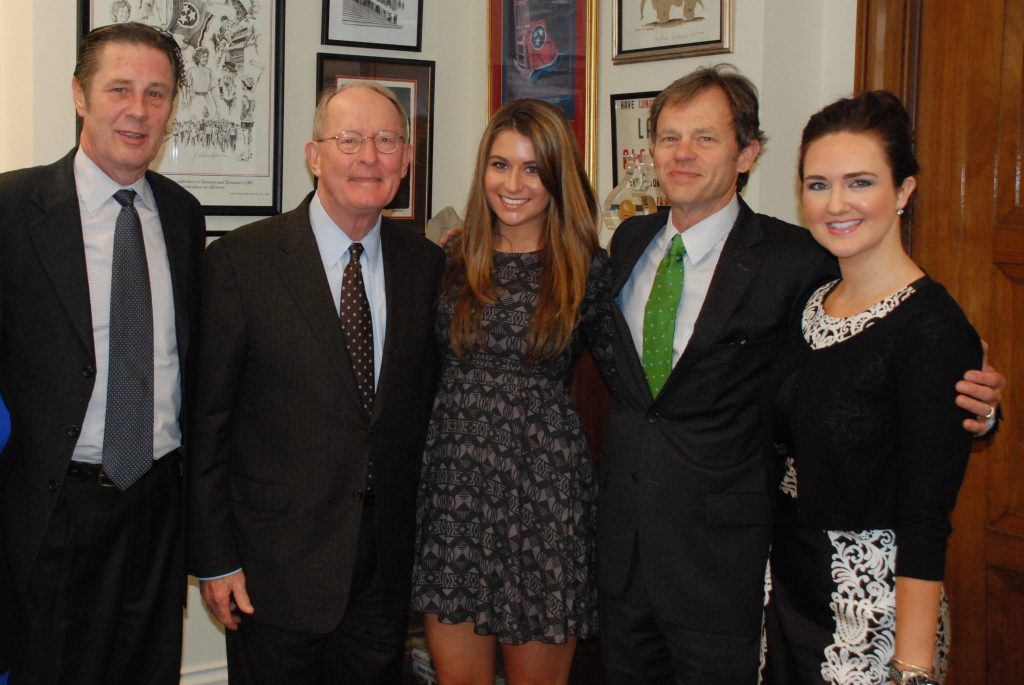

Pictured (L-R): Bart Herbison (NSAI Executive Director), Congressman Lamar Alexander (R-TN), Songwriters Bonner Black, Tom Douglas, and Claire Douglas
Songwriter Tom Douglas, a longtime member of the Nashville Songwriters Association International (NSAI), testifies Friday (Jan. 26) at a U.S. House of Representatives Field Hearing to be held at Fordham University in New York City.
Douglas will support the “Music Modernization Act of 2017” during his testimony. Known as one of the most moving speakers among American songwriters, Douglas has been an active part of NSAI’s advocacy efforts including visits on Capitol Hill.
Read Douglas’ testimony below:
Chairman Goodlatte, Ranking Member Nadler, and Members of the House Committee on the
Judiciary:
Thank you for this opportunity to testify about the Music Modernization Act of 2017, which I
will refer to today as the MMA. This legislation is critically important for songwriters,
addresses multiple areas of the music licensing ecosystem and is a bi-partisan bill supported by
an unprecedented collection of songwriter groups, other music industry groups and the digital
services themselves.
My story is similar to that of most American songwriters. I began writing songs at an early age
while I was still in school. After graduation, I moved to Nashville to try to make songwriting
my profession. After a few years with little success at songwriting and wanting to marry and
raise a family, I had to turn away from my dreams and moved to Dallas to work in real estate.
Attending a songwriter conference in Austin six years later, I handed a cassette tape copy of
one of my songs to a noted music producer named Paul Worley. Thankfully he listened to that
song when he returned to Nashville. That song “Little Rock,” became a No. 1 hit for Colin Raye in
1994. About a man in recovery, it still serves as an anthem for individuals and their families
dealing with substance abuse. And while I was not dealing with substance abuse, I guess part
of the song was really about me adapting to a life without songwriting as my job.
People don’t know the songwriter Tom Douglas, but their lives have been enriched by my
songs such as: “The House That Built Me,” “I Run To You,” “Raise ‘Em Up,” “Grown Men Don’t
Cry” and “Southern Voice.” This is true of all songwriters, especially those who are not
artists. Our songs identify American culture and move hearts and minds across the globe. Our
songs have value. That’s why adoption of the MMA is critical.
The Music Modernization Act includes:
• A new rate standard for songwriters’ digital mechanical streaming royalties. The
Copyright Royalty Board will be able to utilize the willing-buyer, willing-seller rate
standard that should result in more equitable rates because it is based on what my song
would be worth in a free market.
• Song ownership issues are addressed through a new blanket licensing entity called the
Music Licensing Collective. Governed by music publishers and songwriters the
Collective will assume responsibility for finding owners and keeping track of ownership
data. Digital services will be relieved from copyright infringement liability as long as
they adhere to best practices.
• The U.S. Copyright Office mass “Notice of Intent” (NOI) program that created many
burdens on songwriters and resulted in millions of dollars of unpaid royalties, will be
eliminated.
• Songwriters will, for the first time, be legally entitled to at least half of all unclaimed
funds from digital mechanicals to be equitably distributed based on songwriter activity.
• And ASCAP and BMI rate court judges will be randomly selected instead of being
appointed for life. By eliminating Section 114i of the Copyright Act, those judges will be
able to consider market factors like what record labels and artists earn for performances
of the song I wrote.
When my first hit song, “Little Rock,” was climbing the charts, artists sold millions of albums
and broadcast radio was not being challenged by streaming companies yet to exist. My
royalties for record sales or terrestrial radio broadcasts were counted in pennies. When my
song is streamed, royalties are counted in micro-pennies. For songwriters, it is not uncommon
for millions of streams to equal only hundreds of dollars in royalty payments.
For many years songwriters have begged Congress for relief. The entire American songwriter
community is hopeful we will begin finding that relief in the Music Modernization Act.
The MMA won’t immediately or completely solve songwriters’ digital rate woes, but it sets us
on the right path. The present standard of evidence to set my mechanical royalty rates was
established by Congress in 1909 for player piano rolls. Why so long? Because reaching
agreements between songwriters, music publishers, performing rights societies, record labels,
streaming companies and their representative organizations is Herculean. But, the MMA
represents precisely such a compromise.
Congressman Doug Collins should be commended for his ability to navigate the differences
these groups held. He and Congressman Hakeem Jeffries have led our industry into a new era
of cooperation with the introduction of the Music Modernization Act of 2017.
On behalf of American songwriters, I ask the House Committee on the Judiciary to swiftly
adopt this historic legislation.

Category: Featured
About the Author
Jessica Nicholson serves as the Managing Editor for MusicRow magazine. Her previous music journalism experience includes work with Country Weekly magazine and Contemporary Christian Music (CCM) magazine. She holds a BBA degree in Music Business and Marketing from Belmont University. She welcomes your feedback at jnicholson@musicrow.com.View Author Profile


